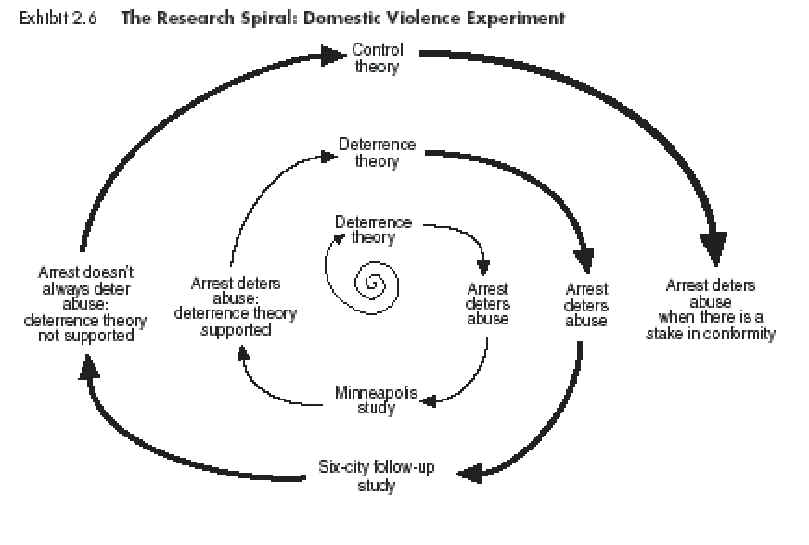|
| |
The
Research Process
 | Questions |
 | Theories |
 | Hypotheses |
 | Guidelines |
Criteria for
Social Research Questions
 | Feasibility |
 | Social Importance |
 | Scientific Relevance |
Feasibility
 | The availability of resources will
determine whether the question can be answered at all |
Theory
 | A logically interrelated set of
propositions about empirical reality. |
 | Suggest topic areas and propositions that
can be tested empirically. |
 | Ex. Deterrence or labeling |
Deductive Research
 | Strategy of connecting theory and data |
 | Moving from theory to data and then back
to theory |
Deductive
Reasoning Example
 | Punishment for a deviant act reduces the
likelihood that a person will repeat the act
 | Therefore it is likely that children who
are spanked for fighting with their siblings will be less likely to fight with their
siblings. |
Research Circle
|

Hypothesis.
 | A tentative statement about empirical
reality involving a relationship between two or more variables. |
 | Specific expectation deduced from more
general theory. |
 | States in prepositional form a
relationship between variables.
 | If-then statement. |
|
Variable
 | A characteristic or property that can
vary. |
 | Examples:
 | country of origin, income, gender, divorce
rate |
|
Independent variable
A variable that is hypothesized to cause,
or lead to, variation in another variable.
Dependent variable
 | A variable that is hypothesized to vary
depending on or under the influence of another variable, or effect of variation in
another variable. |
Relationships between
variable
 | Independent variable is to dependent
variable as cause is to effect. |
 | If two variables are said to have a
positive association, the dependent variable will increase as the independent increases. |
 | If two variables are said to have a
negative association, the dependent variable will decrease as the independent increases. |
Empirical
generalization
 | statements that describe patterns found in
data |
Replication
 | repeat of a study in a different setting |
 | essential to establish its
generalizability in other situations |
Inductive
Reasoning
 | Begins with specific data, used to develop
(induce) a general explanation (theory) to account for data. |
 | Looks at those who were deterred from repeat abuse
offense and then tried to see why. |
Serendipitous
findings
 | anomalous patterns in the data |
 | finding of unexpected patterns in the data |

Qualitative
approach
 | Trying to understand phenomena by asking
people how they see the social world is characteristic.
 | In depth observation or interviewing |
 | Findings based on what people have to say
"in their own words" |
 | Explanations are richer and more finely
textured |
 | Explanations sound more authentic |
|
Philosophies of
Quantitative Research
 | Positivism
 | belief in the existence of objective
reality |
|
 | Postpositivism
 | there is an empirical reality, but
understanding is limited |
|
Postpositivism -
Goal of Science
Scientific Guidelines
 | Test ideas against empirical reality
without becoming too personally invested in a particular outcome. |
 | Plan and carry out investigations
systematically. |
 | Document procedures, disclose publicly. |
 | Clarify assumptions. |
 | Specify the meaning of all terms. |
 | Maintain skeptical stance re: current
knowledge. |
 | Replicate research and accumulate
knowledge. |
 | Maintain an interest in theory. |
 | Search for regularities, or patterns. |
Ethics of Research
on People
 | Cause no harm |
 | Participation is voluntary
 | informed consent |
|
 | Anonymity or confidentiality must be
maintained |
 | Researchers fully disclosed identity |
 | Benefits should be compensated for their
time and effort |
Debriefing
 | explanation of what happened in an
agreement |
 | reduces the risk harm to subjects |
Scientific
Guidelines
Test ideas against empirical reality
without becoming too personally invested in a particular outcome.
Information
Sources
|
|

